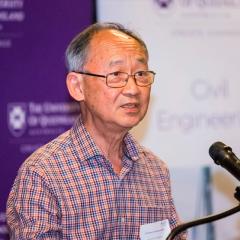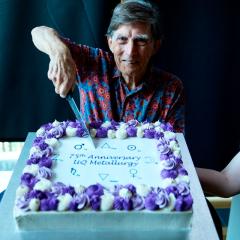Twelve researchers from across the Faculty of Engineering, Architecture and Information Technology (EAIT) have been awarded more than $14 million in prestigious Australian Research Council (ARC) Fellowships.
The ARC Fellowships, awarded to researchers across all career stages, represent a substantial investment in projects to tackle Australia’s most pressing environmental, industrial, and technological challenges.
ARC Early Career Industry Fellowships: Empowering Emerging Talent
Four Early Career researchers received over $2 million to fast-track transformative solutions in water treatment, emissions reduction, sustainable energy and intelligent automation.
- Dr Jiuling Li from the Australian Centre for Water and Environmental Biotechnology – ACWEB was awarded $515,000 to lead a critical effort to quantify and mitigate methane emissions from sewer networks. With industry partners Water Corporation and South Australian Water Corporation Dr Li is developing predictive models and real-time control systems to help water utilities meet net-zero goals.
- Dr Zhiyao Wang from the School of Chemical Engineering, and the Australian Centre for Water and Environmental Biotechnology – ACWEB received almost $515,000 to tackle emissions from sewage sludge. With the support of South Australian Water Corporation, Dr Wang’s project focuses on innovative acidic aerobic digestion technology, designed to cut greenhouse gas and odour emissions from sludge treatment processes, supporting the transition to a low-carbon future.
- Dr Peng Chen from the School of Chemical Engineering, with a joint appointment at the Australian Institute for Bioengineering and Nanotechnology. was awarded more than $506,000 to advance lead-free, tin-based perovskite solar cells designed for indoor use. This will offer an eco-friendly, battery-free power source for devices, in partnership with Halocell Energy.
- Dr Zijian Wang from the School of Electrical Engineering and Computer Science received more than $500,000 to enhance AI-driven scene perception in complex industrial environments. In partnership with Logan City Council and the Baosteel Company, this project aims to make AI models more adaptable, and efficient for road management and steelmaking, boosting safety and innovation.
ARC Mid-Career Industry Fellowships: Bridging Academia and Industry for Sustainable Impact
Three mid-career EAIT researchers were awarded more than $3.4 million to address national priorities in recycling, decarbonisation, water safety, and energy storage.
- A/Prof Jingwei Hou from the School of Chemical Engineering received $1.2 million to develop a revolutionary molten salt process to recycle end-of-life solar panels. In partnership with Pan Pacific Recycling Pty Ltd and the Smart Energy Council, this work aims to recover valuable metals like silver, copper, and silicon to boost recycling efficiency while diverting millions of panels from landfill.
- Professor Esteban Marcellin, Director of the UQ Biosustainabilty Hub, who has a joint appointment with the School of Chemical Engineering and the Australian Institute for Bioengineering and Nanotechnology. received more than $1m to work with industry partner Woodside Energy to convert methane and CO2 into a complete fish meal replacement. The process provides bioconversion technologies for the gas industry and helps Australia transition to a strong bioeconomy.
- A/Prof Bin Luo who is jointly appointed at the School of Chemical Engineering and the Australian Institute for Bioengineering and Nanotechnology. secured $1.2 million to work with Northernjoin Industrial to develop sustainable manufacturing of bipolar plates for Redox Flow Batteries. These are a critical component in renewable energy storage systems and will help reduce Australia’s reliance on imports and promote local value-added manufacturing.
ARC Industry Laureate Fellowship: Leading Australia’s Hydrogen Future
UQ received one of only eight ARC Industry Laureate Fellowships awarded nationally, for work to advance research that will help position Australia as a global leading supplier of hydrogen.
- Professor John Zhu from the School of Chemical Engineering received over $4 million to develop New Generation Solid Oxide Electrolysis Cells for Hydrogen Production, working with Industry Partners Direct Energy Holdings Pty Ltd and Hydrogen Solutions Ltd.
ARC Future Fellowships: supporting innovative projects with significant national and international benefits
The diverse research efforts of these four mid-career researchers promise to advance Australia’s capabilities across critical technologies, from improving healthcare diagnostics to accelerating the clean energy transition and safer transport systems.
- Dr Shakes Chandra from the School of School of Electrical Engineering and Computer Science was awarded more than $1million to develop a next-generation MRI technology. This novel approach is expected to improve the efficiency, speed, and affordability of MRI scans, while enhancing explainability in AI models and advancing critical AI research in Australia.
- Dr Miaoqiang Lyu from the School of Chemical Engineering and an Affiliate of Nanomaterials Centre, received almost $1 million to develop low-toxicity perovskite semiconductors for indoor photovoltaics. The project seeks to power electronic devices sustainably and enhance Australia’s competitiveness in clean tech research.
- A/Prof Ruifeng (Richard) Yan from the School of Electrical Engineering and Computer Science was awarded almost $1.3 million to develop a data-driven modelling framework for renewable energy generators. This work will drive breakthroughs in grid stability and support broader renewable energy adoption.
- Professor Zuduo Zheng from UQ's School of Civil Engineering secured almost $1.3 million for a project to develop an automated vehicle (AV) testing platform using augmented virtual testing. This innovation will help ensure safer AV deployment and support the “triple-zero” goal: zero fatalities, injuries, and emissions.
Shaping the Future Through Research
These fellowships not only underscore the calibre of EAIT researchers but also highlight their strong collaboration with industry partners across water, energy, manufacturing, and infrastructure sectors.
Acting Associate Dean (Research), Associate Professor Rowan Gollan said the diversity and impact of the awarded projects demonstrate EAIT’s commitment to addressing the world’s most pressing challenges through research excellence, collaboration and innovation.
“From water sustainability to advanced manufacturing and renewable energy, our researchers are developing solutions that will drive environmental, social, and economic benefits for Australia and the world.”



